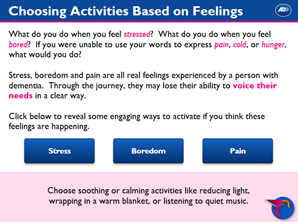Guest post by Isabel Terrell, VHA Home HealthCare
As family caregivers experience new barriers and challenges amid the second wave of COVID-19, a new tool from VHA Home HealthCare (VHA) is providing creative ways to engage loved ones living with dementia and improve their quality of life at home.
 Heart in Mind Activation Therapy was designed by rehab therapists at VHA and is a free online toolkit designed to provide practical ideas to engage clients living with dementia in a meaningful way. The module provides easy access to feelings-based communication and activity ideas to empower families, personal support workers, therapists and other healthcare providers to stimulate the body and mind.
Heart in Mind Activation Therapy was designed by rehab therapists at VHA and is a free online toolkit designed to provide practical ideas to engage clients living with dementia in a meaningful way. The module provides easy access to feelings-based communication and activity ideas to empower families, personal support workers, therapists and other healthcare providers to stimulate the body and mind.
“With this project, we aspire to empower caregivers to better understand the role of feelings in dementia and to help them use this knowledge to enhance their person-centered care,” says Brandi D’Souza, co-creator of Heart in Mind and Physiotherapist.
Heart in Mind was born and developed with the help of a grant from Baycrest’s Centre for Aging + Brain Health Innovation, as well as co-creators and Occupational Therapists Motria Sabat and Wilfred Leung.

“In my work as an OT, I often encounter clients who struggle with their memory, with various diagnoses including Alzheimer’s,” says Motria.
“It can be difficult to see not only clients struggle with fading memories, but caregivers struggle with how to engage and relate to the changes they see.”
That’s a big reason why the team set out to create Heart in Mind — and make is easily accessible to the public. Through the tool, they seek to offer users the knowledge about the role of feelings in dementia, as well as practical tips to engage in conversations and activities that focus on feeling good.
The Heart in Mind education module and a printable booklet are easily accessible anytime at vha.ca/HeartInMind. The program covers a wide range of strategies to enhance the quality of life for those living with dementia including how to: engage feelings, understand personal stories and interests, communicate in their language and take part in meaningful activities.
The research process began in May 2018. After completing a Dementia Care Matters Butterfly Model course, which had already shown promise in the long-term care setting. The team felt confident they could build something that would honour a person and emotion-centered approach to dementia care for home care providers.

A sample of activities within the Heart in Mind Activation Therapy toolkit.
They were able to incorporate other learnings from their work into Heart in Mind, including a tool to engage physical activity for older adults living with cognitive impairment, and research on the Indigenous Cognition and Aging Awareness Research Exchange.
Brandi, Wilfred and Motria also consulted with family caregivers and personal support workers, who provided valuable insights that helped shape the content of the toolkit.
“It was so exciting to build upon great work that has already been done at VHA and beyond, says Brandi.
“The ultimate vision is to change the dialogue on how care can be provided in the home – from a task-based orientation to a relationship-centered approach, creating a collaborative spirit between the care team where heart is at the top of our minds.”


